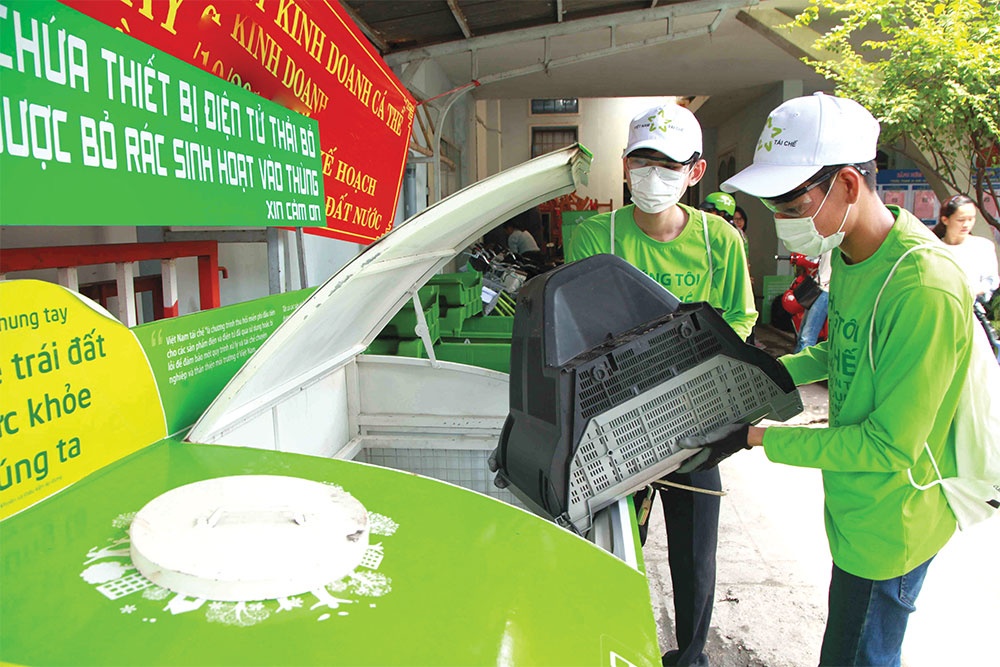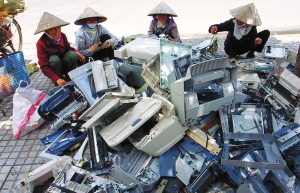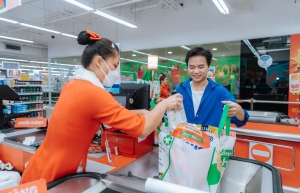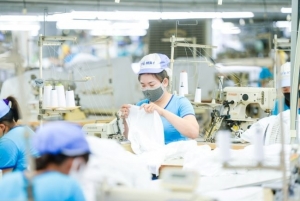Businesses to tackle waste recycling model
 |
| Only a handful of smaller companies boast full and licensed processing lines to handle some items, photo Le Toan |
Manufacturers that produce or import items like batteries, accumulators, tyres, lubricants, and packages for food, cosmetics, drugs, fertilisers, animal feed, detergents, and commercial cement will be responsible for recycling costs from January 2024. Electrical and electronic products will be included from 2025 and vehicle products from 2027.
A large part of these types of waste are hazardous, thus the opportunity for recycling firms is widening as the law will allow producers to either recycle themselves, hire recycling facilities, or authorise intermediate organisations to support their recycling efforts.
A representative of Tan Thuan Phong JSC, which is involved in production of non-ferrous metals, mineral processing, and transportation and treatment of hazardous waste in the northern city of Haiphong, said that many foreign-led manufacturers had recently contacted the company to ask about recycling waste costs and specific services.
“Studying these costs of ours, and other companies, is a basis for producers to decide whether they will recycle themselves or hire outside help as the rules change,” the representative said.
Tan Thuan Phong was established more than 20 years ago and boasts a portfolio of traditional customers.
“Regarding exporters, the emissions mitigation and waste control are their compulsory requirements to retain customers. Many foreign-invested manufacturers are seeking professional and methodical recycling partners to ensure their reputation. Thus, the potential for the recycling industry is huge. I believe that the application of extended producer responsibility will open more opportunities for recycling companies like us,” the representative said.
Meanwhile, Nguyen Vui, manager of recycling projects at Phu Thai CAT, said there was room in Vietnam to exploit hazardous waste treatment.
“For example, 64,000 tonnes of e-waste are collected by the informal sector each year. Less than one-third of this is recycled and treated by licensed recycling companies. Thus, the remainder is worth looking into for recycling companies,” Vui said.
Despite this, some recycling companies struggle to develop waste treatment plants and attain licences.
“When we relocated the plant to an industrial zone, it took more than three years to get planning approval due to the lack of synchronisation in the legal framework, impacting our business plan,” explained a representative of one recycling company in the north, which was one of the first three to get a licence in Vietnam for waste treatment.
“The appraisal of environmental impact assessment reports is also another tough journey. The promulgation of management policy is important, but the implementation process and the human factor are more important.”
Along with approval problems, there is also a lack of collection facilities and a low quality of output materials caused by inaccurate waste separation.
For example, the amount of e-waste in Vietnam is increasing rapidly and diversifying in type. These products remain a valuable source, but proper recycling and appropriate infrastructure are lacking. Only a few small companies have full processing lines to be licensed to handle electronic circuit boards and electronic elements.
“Recycling many other types of waste such as batteries, accumulators, electronics, and vehicles also faces many difficulties, mainly from the complexity of the products as well as the lack of collection and classification solutions. In addition, the difficulty comes from treating secondary pollution,” the recycling company spokesperson added.
Deputy Minister of Natural Resources and Environment Vo Tuan Nhan encouraged businesses to implement recycling activities at a conference in June.
“Vietnam will continue to implement environmentally sound management of hazardous chemicals and waste throughout their life cycle; reduce waste based on the principles of the circular economy and following national policies; and improve the legal framework for the management of persistent organic pollutants and waste,” Nhan said.
He also stressed that Vietnam would work closely with ASEAN member nations and beyond to mobilise resources for capacity building, tech transfer, and experience sharing on hazardous chemicals and waste management to contribute to building a greener region.
 | Production costs at risk with draft recycling rules Local manufacturers have suggested that authorised agencies should consider a more appropriate level of recycling costs to reduce business expenses. |
 | Unilever and Central Retail team up on plastic waste A ceremony on August 23 to launch a cooperative agreement between Unilever Vietnam and Central Retail Vietnam on plastic waste segregation is indicative of their joint commitment to alleviate the current burden on the environment and bring the ideals of the circular economy to fruition. |
 | Roadblocks remain in apparel production recycling The textile and apparel sector is making efforts to recycle input materials to reduce waste while preserving natural resources, although barriers persist. |
What the stars mean:
★ Poor ★ ★ Promising ★★★ Good ★★★★ Very good ★★★★★ Exceptional
Related Contents
Latest News
More News
- A golden time to shine within ASEAN (February 19, 2026 | 20:22)
- Vietnam’s pivotal year for advancing sustainability (February 19, 2026 | 08:44)
- Strengthening the core role of industry and trade (February 19, 2026 | 08:35)
- Future orientations for healthcare improvements (February 19, 2026 | 08:29)
- Infrastructure orientations suitable for a new chapter (February 19, 2026 | 08:15)
- Innovation breakthroughs that can elevate the nation (February 19, 2026 | 08:08)
- ABB Robotics hosts SOMA Value Provider Conference in Vietnam (February 19, 2026 | 08:00)
- Entire financial sector steps firmly into a new spring (February 17, 2026 | 13:40)
- Digital security fundamental for better and faster decision-making (February 13, 2026 | 10:50)
- Aircraft makers urge out-the-box thinking (February 13, 2026 | 10:39)

 Tag:
Tag:













 Mobile Version
Mobile Version